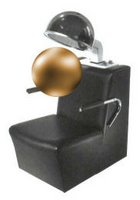
Last week the International Astronomical Union (IAU) passed a resolution that stripped Pluto of its traditional (at least since its discovery in 1930) designation as one of the planets of the solar system.
This was a knee-jerk (and in my opinion, wrong-headed, mean-spirited, ill-conceived, and premature) reaction to an earlier and more elegant proposal that would not only have reaffirmed Pluto's status, but immediately added the largest of the asteroids orbiting between Mars and Jupiter, Pluto's "satellite" Charon (due to a minor technicality they would have been designated as a twin-planet) and the unofficially designated "Xena," a recently discovered Pluto-like body located in the distant suburbs of the solar system. Not nine planets. Twelve.
But apparently what really frosted the astronomers was the almost certainty that we'll be discovering many more bodies like Pluto and Xena in the coming years. Dozens, possibly hundreds wait to be discovered out in the dark fringes of our celestial neighborhood.
This, according to the arbitrary will of the astronomers, is just too darned many. And with this vote, the truth about planetary astronomers is finally revealed. They are the under-achievers of science.
Not only can't they remember more than nine planets, nine is apparently too many so they've cut back to eight. We're talking Science for Dummies here. (And I don't mean to paint stellar astronomers with the same brush, as, according to one well-known source, they keep track of "billions and billions" of stars. Impressive.)
Compare this to chemists, who seemed to have no trouble with a periodic table that had more than 90 elements, even before the physicists started making more. Given the current 116 confirmed elements, we can only assume that they are, on average, about 14.5 times as smart as a typical planetary astronomer (up from about 12.888 times just days earlier).
One can only imagine if planetary astronomers were in charge of the periodic table. Certainly they'd have eliminated all the radioactive elements ("...anything unstable enough to have a 'half-life' just shouldn't be considered an element...").
Probably there are other places they would have cut back. Noble gases? "Don't interact with anything enough to be worth mentioning." Hydrogen? "Too darned light." Actually, they could have gone for four, well within the established mental capacity of a planetary astronomer: earth, fire, water and air. "If it was good enough for the Greeks..."
Or compare that to that most garden-variety version of the scientific mind, the family physician. They seem to have little trouble dealing with the more than 200 bones in the adult, human, skeleton, or even the 270 or so bones in a newborn (many fuse together as the baby grows).
Certainly, planetary astronomers would have long-ago cut loose the bones of the inner ear (too small, too different, and not connected to anything), or the thyroid bone that anchors your tongue muscles (also not connected to the rest of the skeleton). Heck, ribs, vertebra, those little things inside your fingers and toes? All similar members of a large class of objects, not worth calling bones. Heck, with a couple voting meetings of it IAU, I think they could get it down to the skull and pelvis, and we're really not so sure about the pelvis.
For that matter, as I recall from when I was a child and my mother was studying for her cosmetology license, even they were required to learn basic anatomy, including the bones of the body. So when you get right down to it, planetary astronomers aren't even smart enough to be hair-dressers. (It also means that my mother is, statistically speaking, many times smarter than any planetary astronomer on -- well -- the planet. Hi mom!)
Okay, okay, I'm having some good-natured fun here at the expense of my astronomer friends. (Well, I'll admit, that most of my science friends are physicists, mathematicians, or chemists, but you shouldn't read too much into that.) But I'm also making a point. My astronomer friends seems to be suspiciously eager to keep the planetary club small and exclusive. In turn, their reasons and reasoning seem, at least, questionable.
The original proposal for a definition of planet seemed simple and elegant enough. A planet would have been any body that has achieved a spherical shape through the action of its own gravity, and which follows an independent path around the sun. The new proposal reads more like an excerpt from the tax code, and in requiring that a planet have cleared its orbit of other bodies, may mean that we'd end up with no planets! (Pluto's orbit crosses that of Neptune, for instance, and many asteroids cross the orbits of the inner planets, including Earth.) Advocates of the new system complain about possible ambiguities of the earlier proposal (define "spherical," for instance), but ignore the big glass of muddy water they've served up in its place.
And though they rationalize their objections to the first proposal, it all seems to come down to "too many planets." I don't seriously think that objection is because they can't keep track of them all, which leaves me to wonder what their concern is. Could it possibly be that discovering a new planet was once one of the greatest achievements in astronomy? Maybe the idea that dozens, perhaps hundreds of such discoveries could be made in a single generation, just plain sucks all the special out of it. Or maybe its that those few astronomers positioned to make those discoveries could get just a little too famous too fast for some people's tastes.
Okay, I don't know that much about astronomy, but as a writer, I do know a thing or two about the importance of words. Even under the new system, Pluto and its icy kin would still be known as "minor planets," so what's the big deal?
It's just this: Defining terms are important. None of the definitions proposed for a planet seems to have much scientific value. Mercury isn't much like Jupiter, and never will be. There are many satellites in the solar system that we'd probably be happy to call planets, if they weren't already orbiting something else. All that's really being proposed is an arbitrary line in the sand that satisfies somebody's inflated sense of order. Over here the important bodies of the solar system. Over here, the other stuff.
Defining something as a planet gives it importance that has real-world (no pun intended) consequences. The most obvious example is NASA's New Horizons probe currently on its way to explore Pluto. Sending probes to study the outer solar system is incredibly expensive and technically challenging, so much so that New Horizons almost didn't fly. Would it have even been considered if Pluto had not, at the time, still been commonly designated a planet? I think not.
Then consider the thousands of smaller consequences. Will new astronomers be as interested in devoting their careers to the study of "minor planets," as opposed to the possibility of actually discovering a planet (even if it is only one of many)? Will as much grant money be devoted to "minor planets?" Will papers be as readily published? Will telescope time be allocated? Awards given out? Will studying "minor planets" get you tenure as fast as study of "real" ones? Will school-children even find them worth learning about?
The unintended consequence here is that the IAU has slammed the door shut on the newest (to our eyes) and potentially most exciting part of the solar system. We're just learning that the solar system is a much bigger and more complex place than we'd ever imagined. This is something worth of our attention and study. It is not "minor," it is "major" by any reasonable definition.
It would be ironic if we turned our back on the distant reaches of our solar system simply to salve a few swollen egos back on Earth. Yet according to the IAU, the final frontier should be very final indeed.













